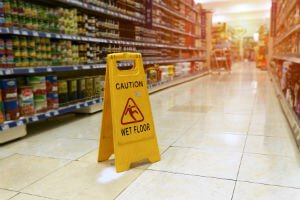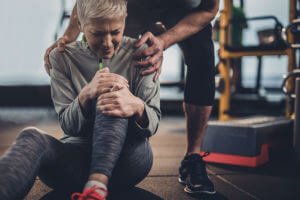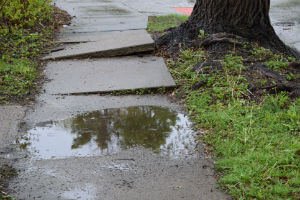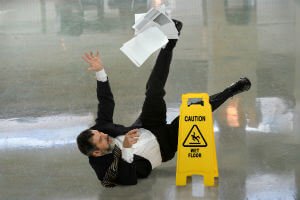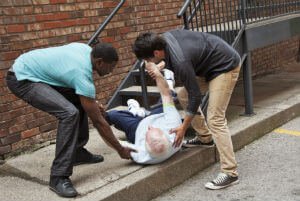 One of the most common questions that our Indiana personal injury lawyers receives is who is legally responsible for a slip-and-fall accident.
One of the most common questions that our Indiana personal injury lawyers receives is who is legally responsible for a slip-and-fall accident.
Premises liability principles apply when a person is injured on property belonging to another person or entity. These principles determine the legal duties that property owners and managers have to maintain their property, and the extent of damages that they may be responsible for paying if an accident occurs.
If you were injured in a slip-and-fall accident in a store, governmental property or at someone else’s home, you may be able to pursue compensation for the medical bills, lost time at work, pain and suffering, and other damages. Contact our skilled premises liability attorneys in South Bend for advice on the next steps you can take toward recovering compensation. We can help ensure that you file your claim on time, and we will fight for your right to the compensation you deserve.
Call (574) 444-0741 today to schedule a free case review with a skilled attorney.
Liability of a Homeowner
Accidents commonly occur in homes. A person may slip and fall on another’s property because of accumulation of snow and ice. Guests may stumble because of uneven steps or cracks, inadequate lighting, or even broken railings.
Homeowners have a legal duty to keep their homes reasonably safe. However, the exact legal duty that the homeowner owes to visitors is based on the guest’s status, as described below:
- Invitee – An invitee is a person who enters the property by an expressed or implied invitation by the owner. Homeowners owe invitees the highest degree of care, including the duty to exercise reasonable care toward the guest. This may include the duty to make the property safe and to warn guests of any known dangers.
- Licensee – A licensee is a person who received permission to be on another’s property for his or her own convenience. The homeowner is responsible for refraining from taking any action that would willfully or wantonly injure a licensee. Additionally, the owner or manager has the duty to warn licensees of any non-obvious dangers on the property of which the property owner is aware.
- Trespasser – A trespasser is a person who enters a property without the owner’s expressed consent. The landowner only owes trespassers the duty not to wantonly or willfully injure them.
Usually, homeowner’s insurance covers accidents that cause injury to invitees or licensees. Insurance may cover medical expenses, lost wages and other expenses that injured guests sustain.
Liability of a Landlord
Many properties are rented out and managed by private landlords or property managers who have the responsibility to keep the premises safe. Their duties may include:
- Keeping pathways clear of snow and ice
- Keeping stairwells free of debris and other hazards
- Completing timely repairs in common areas
- Ensuring construction and repairs are in compliance with building codes
- Providing adequate lighting
Also, there may be contractual provisions or municipal ordinances that place these responsibilities on the tenant or others.
Liability of a Business Owner
Business owners are responsible for keeping their properties safe. Many businesses are open to the public and profit from the presence of customers, who are often considered invitees under state law. Businesses must keep their premises safe for customers, workers and business guests.
Some common causes of slip-and-fall accidents in businesses include:
- Wet floors – Customers or business guests may slip on floors that are wet because of ice, snow or spills. Waxed floors can also cause slips and falls.
- Uneven flooring – Individuals may slip and fall because of rugs, floor mats or other uneven floor surfaces. Cracked sidewalks, uneven stairs or unlit areas can also lead to injury. Carpet may be torn or bulging, and flooring may have holes that can cause guests to trip and fall.
- Faulty stairs – Stairs are a common hazard at businesses. They may be broken, crumbling or have missing handrails. They may be structured without compliance to building codes.
- Improperly functioning escalators and elevators – Improperly maintained escalators or elevators can lead to serious injuries, especially as guests step on and off.
Government Liability
Sometimes the property that a person is injured on is owned by the public. This property may be operated by government entities at the city, county, state or federal level. Governmental agencies are required to keep the premises safe just like private owners are.
However, these types of injury claims may have additional complications. For example, state law says government entities cannot be held liable if an injury was caused by certain things, such as the natural condition of improved property or failing to inspect the property.
Additionally, Indiana law requires that you provide specific notice to a governmental agency of a premises liability claim within 180 days from the date of the accident.
Contact a Skilled Attorney for Help
If you were injured in a slip-and-fall accident, contact the experienced personal injury lawyers at Pfeifer, Morgan & Stesiak for assistance. We can help explain your legal options during a free case review.
We will work efficiently to pursue the maximum compensation for your injury claim. We work on a contingency fee basis, so you will not be responsible for any upfront fees. We only get paid if you do.
Fill out our Free Case Evaluation form or call (574) 444-0741 today
to talk to our caring legal team.

